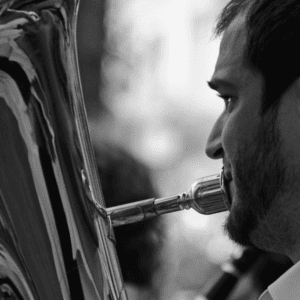Brass chamber music is a constantly changing and growing opportunity for Tuba players. It can open up whole new world of music performance opportunities for you. To be successful at it, there are some rules to be followed. Dial in your focus to a group of 5, and review these 5 do’s and don’ts for your role in the brass quintet.
DO prioritize blending with the group.
While you still need to lay down the beat, you can easily stomp over your fellow musicians if you’re not careful.
- Focus on matching articulation, tone, and dynamics with the other members, especially the trombone.
- Use active listening to adjust balance dynamically.
- Know when to follow the soloist tempo, or keep the rest of the group steady while the soloist takes some musical liberties.

DON’T play too heavy.
One of your biggest challenges will be matching articulation and response with a trumpet player!
- Even if you are laying down the beat, don’t forget the context and the style which you may need to pick up from a French Horn or Trumpet player.
- Keep your playing nimble by focusing on airspeed and avoiding slow or broad attacks.
- When all else fails, look to equipment. Sometimes you might find a mouthpiece with a shallower or different contoured cup will assist. It may require transposition, but using a different key tuba, or Euphonium to provide better blend might be your solution.

DO practice good communication with your group. Body language, eye contact and breathing are all tools you might not have used in a section, but will definitely need in a brass quintet.
- Peripheral vision is your friend as a musician. Keep focus on your colleague’s body movement to cue entrances and changes in musical expression.
- Though your own body movement is limited while playing tuba, use the tempo and style of your breath to communicate your next entrance.
- Anything important to say can be done in 5 words. Be polite, but where critique is needed, stay short and too the point.
Get our newest updates
Receive tips, videos, clinics, community events, and more by joining Denis Wick Tips Blog
DON’T underestimate your music. Always Prepare. There is no hiding in a brass quintet, and you can quickly realize who has prepared and who hasn’t.
- Know your part and how it fits with everyone else before rehearsal (unless it is a sight-reading session) so your rehearsal can stay focused on blend and musicality.
- Mark up your music. You will forget next week what you realized this week.
- Don’t overmark your music. You can go overboard and manifest your performance frustration by 1000 notes to yourself. This will clutter your page and confuse you in performance.
DO find your niche. As a group and as an individual, stay focused on what you do best, and focus on the community that supports it.
- Is it modern music? Show Music? Solo performance? Find what music and performance style your unique grouping of members do best and focus on growing that product.
- School shows, libraries, and retirement homes are always looking for a good performance group. These are great places to practice or prepare for a tour, or recording an album.
- Find what way you best contribute to a group outside of playing. One member cannot to all the arranging, advertising, social media, personnel management, etc. though many times that is the case. Your group will be most successful when everyone takes responsibility for it’s success.









